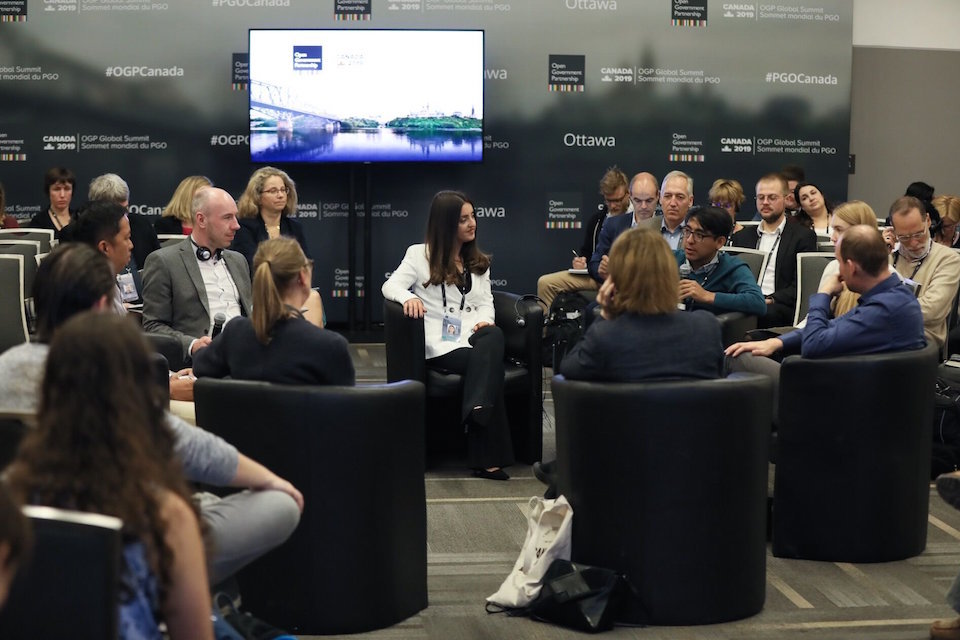Is participation the future of governance? Leveraging OGP commitments as a tool for participatory policymaking
Published 8 July 2019
Reflections and learnings from the session run by the Data Policy, Strategy & Ethics team from the Department for Digital, Culture, Media & Sport during the 6th Open Government Partnership Global Summit in Ottawa, Canada (29-31 May 2019).

Participatory policy panel
1. How can governments ensure that they include the voices of all people in the policymaking process, particularly the underrepresented groups?
● Be disruptive and acknowledge that data is information, and information is power. If governments want to reach out to the wider public, they need to go out and talk to the people and, in the long run, put systems in place that will facilitate this kind of engagement
● Use civic tech to involve different communities (e.g. women, youth, ethnic minorities) in the policymaking process. This can be done through collaborative projects that focus on improving public digital infrastructure or the quality of government data. To strengthen the engagement, participants should be involved from the very beginning of the process, e.g. help choose datasets they will be working on and formulate the scope of policy
● Go beyond technology - platforms and digital tools are useful, yet passive, treat them as one of many options to increase participation. Fieldwork is often a great alternative to maintain the dialogue
● Teach the people to analyse and scrutinise data in different forms, including thick data, ethnographic data, map opportunities for the creators of the data (the public) to connect with the users of the data (governments)
● Remember that not everyone is online and acknowledge data that is not available, address the gaps in the policy design process
● On a local/municipal level, bring more people to the table, organise meetings with stakeholders beyond the usual suspects
2. What to focus on when running participatory policymaking initiatives?
● Perceive the public as the ‘everyday experts’ and value their experience. One way to do this is creating ‘experience’ and ‘expert’ panels; treat all parts of the discussion with equal importance, and make the results transparent
● Be open and listen to people
● Work to develop skills that are currently lacking in the communities, build relationships, work with organisations that are already doing great work
● When running consultations, find neutral and welcoming spaces
● Be patient - explain policy issues as many times as necessary for people to understand, and listen carefully to what they have to say
● Empathy is essential to create real collaboration
● Build long-term partnerships through gradually involving people and organisations in more policymaking conversations, particularly at the local/municipal level
3. How to use participatory processes to increase citizen trust?
● Manage expectations on how public input will be used
● Clearly explain motivations behind the work to increase citizen trust
● Use evidence and share it openly
● Carefully design the participation process
● Genuinely ask about impact
● Admit when policies go wrong and be honest about mistakes
● Speak to people using the language they understand and are comfortable with
● Use user-centred tools, reach out to the entire spectrum of perspectives to ensure that no one is left out in the debate
4. Things to be careful of when designing and running participatory policy projects
● ‘Whose voices, whose choices’ - participatory processes can lead to the illusions of trust. Avoid decisions based on input from the loudest voices, reach out to everyone; recognise underlying biases and address them early in the process
● Wrong questions get wrong answers - carefully formulate your ask
● Participation can be a double-edged sword and can be used in a tokenistic way
● Participatory initiatives are likely to go very wrong if they are not properly thought through within the broader context - for instance, if they don’t account for the complexity of political processes, resulting in loss of public money and political support
Speakers:
● Doreen Grove, Head of Open Government, Scottish Government, Scotland
● Oscar Montiel, International Community Coordinator, Open Knowledge International, Mexico
● Michael Cañares, Senior Research Manager, Digital Citizenship, World Wide Web Foundation, Philippines
● Blerta Thaçi, Executive Director, Open Data Kosovo, Kosovo
● Pauline Véron, Deputy Mayor of Paris, France
● Ott Karulin, Strategy Unit Adviser, Government Office of Estonia, Estonia
Moderators:
● Sam Roberts and Natalia Domagala, Department for Digital, Culture, Media & Sport
This is an open discussion led by DCMS and our government and civil society partners, not an official statement of policy.
